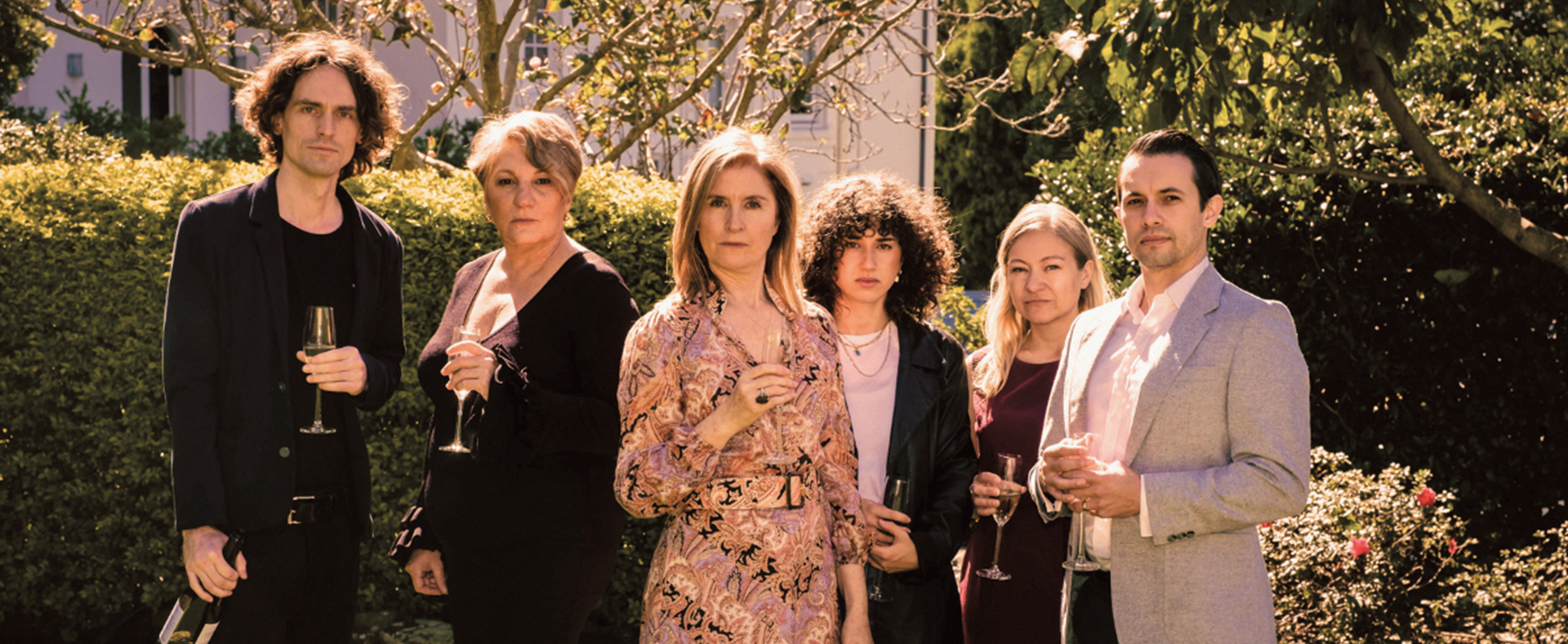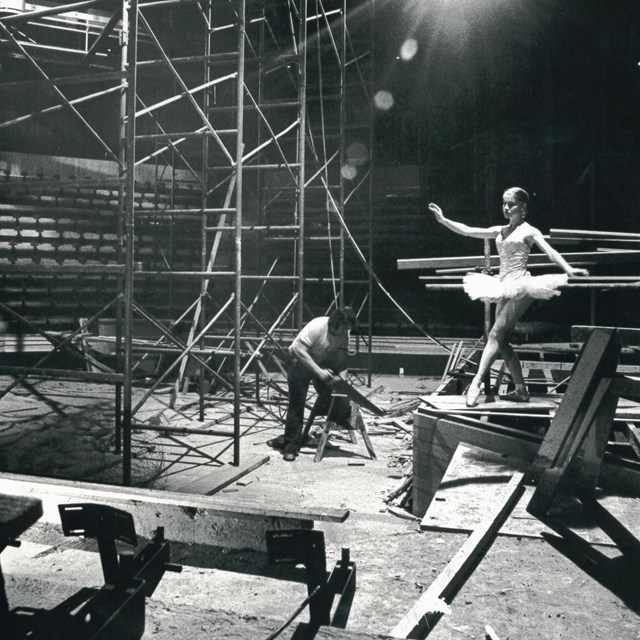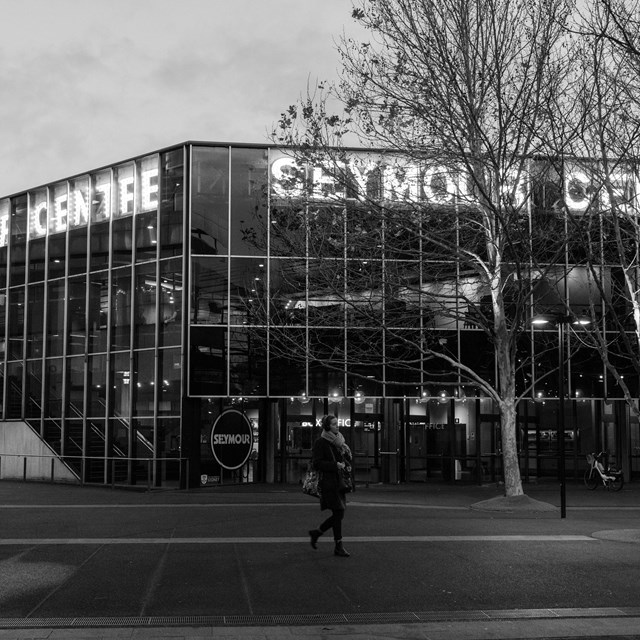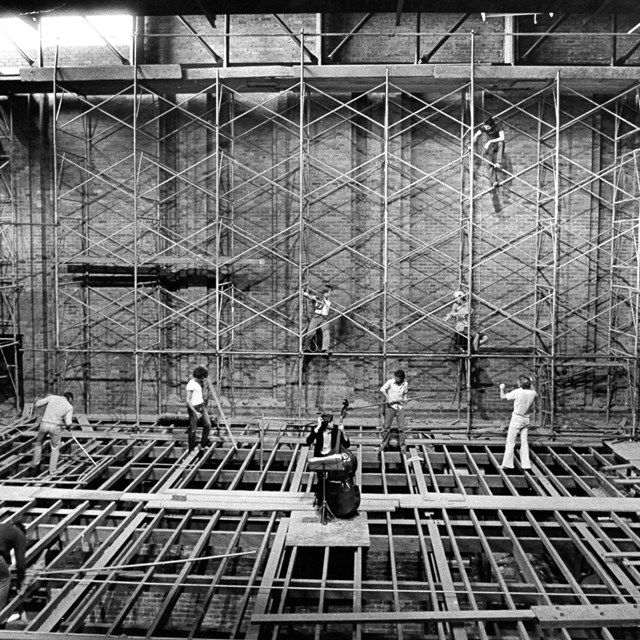The inspiration behind Mike Bartlett’s Albion
How the image of a grand old garden bloomed into a smash-hit drama
After two sensational seasons in London, Mike Bartlett’s smash-hit UK drama, Albion, will make its Australian debut at Seymour Centre this winter, playing as part of our 2022 Seymour Season.
Presented by Secret House and New Ghosts Theatre Company, Albion takes us deep inside Brexit-era Britain, speaking to a nation torn between preserving the past and radically reforming the present—and before it opens on 27 July, we decided to explore what drove Mike Bartlett to pen this poetic, profoundly compelling drama, and to dive deeper into his remarkable career.
A master of his craft
A three-time Olivier Award winner, Mike Bartlett is one of the most exciting dramatists working in the UK today.
Drawn to the world of theatre from a young age, Bartlett was initially interested in directing, but quickly realised his talents were better suited to writing great material rather than presenting it, and was soon penning witty, incisive dramas and comedies that tackled big social issues head on.
His breakout 2009 comedy, Cock, was recently revived on the West End, and his Chariots of Fire adaptation premiered at London’s Hampstead Theatre in 2012 before transferring to the West End.
His punchy 2014 drama, King Charles III, played on the West End and Broadway before transferring to STC, and Albion played to packed houses upon its 2017 premiere, later returning to the London stage for a special encore run in 2020.
The seed of an idea grows roots
As with most plays, Albion started life as a simple seed of an idea. When Bartlett was putting the finishing touches on his 2010 drama, Earthquakes in London, he was struck with inspiration for a sequel, which he imagined could be set in a Chekhovian-style English country house with “characters [who] wanted to get to London and found it difficult, and had that sort of Chekhov-Moscow feel.”
For a while, this was it—an idea that knocked around in Bartlett’s head from time to time, waiting patiently. Then, several years later, it returned almost fully formed: the idea for a new version of Chekhov’s 1903 masterpiece, The Cherry Orchard, set in modern-day Britain.
There were other developments that brought this idea to fruition, too: in a 2017 interview with Almeida Theatre, Bartlett describes the ‘lost Britain’ increasingly lamented by his mother’s generation, and its incongruence with the progressive Britain of the 21st century.
And as this tension between past and present reared its head in public debate, Bartlett realised its dramatic potential and how well it would fit into his new play, saying, “Half of me loves old country houses and that nostalgia, and half of me absolutely knows it's built on death and power and mainly [a] white, colonial, male past… That makes it a really interesting subject for a play.”
Getting to the heart of the issue
Although it explores big, timely themes, Bartlett never intended Albion to be an exercise in academic or political debate, wanting rather to explore the emotional arguments that surround contemporary socio-political discourse.
As a result, the key issues at the heart of the play—like national identity, nostalgia, patriotism, and modern class dynamics—are seldom explicitly discussed, instead being brought to the fore through subtle symbolism and the complex relationships between characters.
Brexit, for example, isn’t mentioned in the play once, but as its characters reflect upon and argue about what it means to be British at this moment in time, we can’t help but cast our minds to the ideological tug-of-war that eventually saw Britain leave the European Union.
Similarly, the play’s sprawling old garden is deeply infused with meaning, representing connection, love, longing for the past, hope for the future, and the political power that emanates from Britain’s colonial past and continues to grow today.
The power of theatre
Bartlett didn’t write Albion to change people’s minds about Brexit and British identity, hoping instead to encourage engagement and interrogation.
“One of the joys of theatre is that you can't argue back in the middle of it,” he says. “You've got to contain it at least until the interval. And hopefully then… you can allow thoughts to percolate, be argued against, to ruminate it yourself.”
Many plays speak to big issues, but few burn with the same urgency as Albion. London audiences were captivated by its premiere run in 2017, and we can’t wait to bring this richly imagined drama to Australian audiences for the first time this July.
12 July 2022
Paying homage to Chekhov’s masterpiece, The Cherry Orchard, this deeply felt drama is shrewdly funny and profoundly poignant, speaking to a nation torn between preserving the past and radically reforming the present.
Buy TicketsAfter two sensational seasons in London, Mike Bartlett’s smash-hit UK drama, Albion, will make its Australian debut at Seymour Centre this winter, playing as part of our 2022 Seymour Season.
Presented by Secret House and New Ghosts Theatre Company, Albion takes us deep inside Brexit-era Britain, speaking to a nation torn between preserving the past and radically reforming the present—and before it opens on 27 July, we decided to explore what drove Mike Bartlett to pen this poetic, profoundly compelling drama, and to dive deeper into his remarkable career.
A master of his craft
A three-time Olivier Award winner, Mike Bartlett is one of the most exciting dramatists working in the UK today.
Drawn to the world of theatre from a young age, Bartlett was initially interested in directing, but quickly realised his talents were better suited to writing great material rather than presenting it, and was soon penning witty, incisive dramas and comedies that tackled big social issues head on.
His breakout 2009 comedy, Cock, was recently revived on the West End, and his Chariots of Fire adaptation premiered at London’s Hampstead Theatre in 2012 before transferring to the West End.
His punchy 2014 drama, King Charles III, played on the West End and Broadway before transferring to STC, and Albion played to packed houses upon its 2017 premiere, later returning to the London stage for a special encore run in 2020.
The seed of an idea grows roots
As with most plays, Albion started life as a simple seed of an idea. When Bartlett was putting the finishing touches on his 2010 drama, Earthquakes in London, he was struck with inspiration for a sequel, which he imagined could be set in a Chekhovian-style English country house with “characters [who] wanted to get to London and found it difficult, and had that sort of Chekhov-Moscow feel.”
For a while, this was it—an idea that knocked around in Bartlett’s head from time to time, waiting patiently. Then, several years later, it returned almost fully formed: the idea for a new version of Chekhov’s 1903 masterpiece, The Cherry Orchard, set in modern-day Britain.
There were other developments that brought this idea to fruition, too: in a 2017 interview with Almeida Theatre, Bartlett describes the ‘lost Britain’ increasingly lamented by his mother’s generation, and its incongruence with the progressive Britain of the 21st century.
And as this tension between past and present reared its head in public debate, Bartlett realised its dramatic potential and how well it would fit into his new play, saying, “Half of me loves old country houses and that nostalgia, and half of me absolutely knows it's built on death and power and mainly [a] white, colonial, male past… That makes it a really interesting subject for a play.”
Getting to the heart of the issue
Although it explores big, timely themes, Bartlett never intended Albion to be an exercise in academic or political debate, wanting rather to explore the emotional arguments that surround contemporary socio-political discourse.
As a result, the key issues at the heart of the play—like national identity, nostalgia, patriotism, and modern class dynamics—are seldom explicitly discussed, instead being brought to the fore through subtle symbolism and the complex relationships between characters.
Brexit, for example, isn’t mentioned in the play once, but as its characters reflect upon and argue about what it means to be British at this moment in time, we can’t help but cast our minds to the ideological tug-of-war that eventually saw Britain leave the European Union.
Similarly, the play’s sprawling old garden is deeply infused with meaning, representing connection, love, longing for the past, hope for the future, and the political power that emanates from Britain’s colonial past and continues to grow today.
The power of theatre
Bartlett didn’t write Albion to change people’s minds about Brexit and British identity, hoping instead to encourage engagement and interrogation.
“One of the joys of theatre is that you can't argue back in the middle of it,” he says. “You've got to contain it at least until the interval. And hopefully then… you can allow thoughts to percolate, be argued against, to ruminate it yourself.”
Many plays speak to big issues, but few burn with the same urgency as Albion. London audiences were captivated by its premiere run in 2017, and we can’t wait to bring this richly imagined drama to Australian audiences for the first time this July.
12 July 2022
Paying homage to Chekhov’s masterpiece, The Cherry Orchard, this deeply felt drama is shrewdly funny and profoundly poignant, speaking to a nation torn between preserving the past and radically reforming the present.
Buy Tickets



